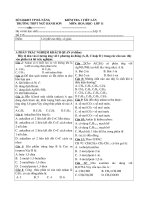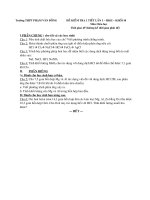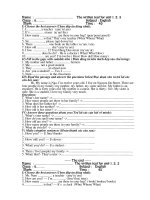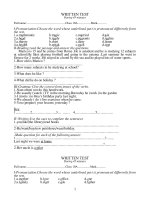Kiem tra 1 tiet lan 1 De No2 2016
Bạn đang xem bản rút gọn của tài liệu. Xem và tải ngay bản đầy đủ của tài liệu tại đây (112.08 KB, 2 trang )
<span class='text_page_counter'>(1)</span>TRƯỜNG TRUNG HỌC PHỔ THÔNG MỸ ĐỨC B **************************. ĐỀ KIỂM TRA TIẾNG ANH 10 (THÍ ĐIỂM) Thời gian làm bài: 45 phút. Họ, tên học sinh:………………………………………………………………….. Lớp: …………………………………………………………… Choose one word whose underlined part is pronounced differently 1. A. things B. engineers C. scientists D. individuals 2. A. parks B. animals C. planets D. environments 3. A. believed B. prepared C. involved D. liked 4. A. lifted B. lasted C. happened D. decided 5. A. train B. crane C. plane D. man Choose from the four options given ( marked A, B, C or D ) one best to complete each sentence by circling the corresponding letter A, B, C or D. 6. You are old enough to take____for what you have done. A. responsible B. responsibility C. responsibly D. irresponsible 7. Billy, come and give me a hand with cooking, A. help B. prepared C. be busy D. attempt 8.______________The students by Mrs. Monty. However, this week they _ _ by Mr. Tanzer. A. are usually taught / are being taught B. usually teach / are teaching C.have usually been taught / have been teaching D. were usually teaching / are teaching A heart………..about 2,000gallons, or 7570 litters, of blood through our bodies every day A. breaks B. jumps C. uses D. pumps 9. How do you divide household chores in your family? A. Take out B. split C. solve D. deliver 10. Many people want to _-------------a habit because it is not good. A. get B. finish C. keep D. kick 11. people call Lan a night owl because she often ______ late. A. get up B. stay up C. studies D. goes to school 12. Onion or garlic may spoil your______ . A. teeth B. stomach C. breath D. eye IV. Use will or be going to to complete the following sentences: 1. A: I’ve got a headache – B: Have you? Wait there and I ____________(get) an aspirin for you. 2. A: Why are you filling that bucket with water? – B: I ___________(wash) the car. 3. Did you post that letter for me? – B: I’m sorry. I completely forgot. I ____________(do) it now. 4. You don’t need your umbrella today. I don’t think it ___________(rain) today. 5. There’s someone at the door. I __________ (open) it. III. Read the passage and choose the best answer: FOOD AROUND THE WORLD It isn't amazing how much time we spend talking about food? "Have you ever eaten ...?", "What do you have for lunch?" and so on. And yet, when you travel from one county to another, you find that people have quite different feelings about food. People often feel that what they eat is normal, and what other people eat is strange and silly. In most parts of Asia, for example, no meal is complete without rice. In England, people eat potatoes every day. In the Middle East, bread is the main part of every meal. Eating becomes a habit which is difficult to change. Americans like to drink a lot of orange juice and coffee. The English drink tea four or five times a day. Australians drink large amounts of beer and the French drink wine every day. The sorts of meat people like to eat also differ from one country to another. Horse meat is thought to be delicious in France. In Hong Kong, some people enjoy eating snakes. New Zealanders eat sheep, but.
<span class='text_page_counter'>(2)</span> never eat goat meat. The Japanese don’t like to eat sheep meat because of its smell, but they enjoy eating raw fish. So it seems that although eating is a topic that we can talk about for hours, there is a little common sense in what we say about it. People everywhere enjoy what they have always eaten, and there is very little we can do to change our eating habit. 1. What is the main idea of the text? A. People have the same feelings about food. B. People think about food differently. C. People think that no meal is perfect without rice. 2. According to the writer, where is bread the main food? A. In Asia B. In Japan C. In Middle East 3. Which of these people drink wine every day? A. Americans B. Australians C. The French 4. Why are the Japanese not interested in sheep meat? A. They don't like its smell. B. It tastes bad. C. Horse meat and goat meat are popular. 5. In which country do people often drink beer? A. France B. Australia C. England 6. Which is popular food in Japan? A. Fish B. Horse meat C. Goat meat 7. How does the writer conclude about our eating habit? A. Our eating habit is difficult to change. B. People everywhere enjoy eating new food. C. We can change our eating habit easily. 8. Match the countries and their popular foods or drinks: ENGLAND, FRANCE, AMERICA, THE MIDDLE EAST, ASIA, ENGLAND.. 1.. 2.. 3.. 4.. 5.. 6.. Change these sentences into passive voice 1. The mechanic is repairing Judy’s car. …………………………………………………………. 2. All his friends will see him off at the airport. …………………………………………………………. 3. They are going to steal your money if you’re not careful. …………………………………………………………. 4. Someone is feeding the seals. …………………………………………………………. 5. She gives him a box. …………………………………………………………. Listen the recording and fill in each blank with a suitable word. When men share the housework, they tend to have better (1)………….. with their wives. Women often feel happy when they see their (2)………… doing housework because it says “He (3)………….. about me and he doesn’t want to put all of the housework on me “. Women whose husbands do not (4)………… to the household chores are more vulnerable to illness and tend to think more about (5)……………....
<span class='text_page_counter'>(3)</span>









